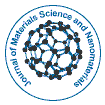The study of Magnetic Materials, Diamagnetic, Paramagnetic, Ferromagnetic, Hysteresis Wind
Received: 20-Jan-2022 / Manuscript No. JMSN-22-58367 / Editor assigned: 23-Jan-2022 / PreQC No. JMSN-22-58367 (PQ) / Reviewed: 10-Feb-2022 / QC No. JMSN-22-58367 / Revised: 20-Feb-2022 / Manuscript No. JMSN-22-58367 (R) / Published Date: 28-Feb-2022 DOI: 10.4172/jmsn.100039
Abstract
Preface to Glamorous Accoutrements Glamorous accoutrements are those accoutrements in which a state of magnetization can be convinced. Similar accoutrements produce a glamorous field in the Girding space, The response of a material when subordinated to an external glamorous field is the root of magnetism. The spinning electrons in the material bear like bitsy magnets. These bitsy attractions are aligned in the direction of applied glamorous field and thereby the material is bewitched.
Introduction
Bracket of Glamorous Accoutrements Grounded on their glamorous parcels, glamorous. Accoutrements can be classified as
• Diamagnetic
• Paramagnetic
• Ferromagnetic
Diamagnetic
• It’s substances which produce a glamorous field in contrary to an externally applied field.
• Vulnerability is negative.
• These have relative permeability slightly lower than continuity.
• They repel the lines of force slightly.
• The exemplifications are bismuth tableware, bobby, lead, gold, .bismuth, zinc, etc.
Paramagnetic
• It’s a substance or body which veritably weakly attracted by the poles of a attraction, but not retaining, any endless captivation [1, 2].
• These have relative permeability slightly lesser than continuity and are bewitched slightly.
• They attract the lines of forces weakly.
• The exemplifications are aluminum, chromium, manganese, lithium, magnesium, etc
Ferromagnetic
• A type of material that’s largely attracted to attractions and can come permanently bewitched is called as ferromagnetic.
• The relative permeability is much lesser than concinnity and is dependent on the field strength.
• These have high vulnerability [3, 4].
• The exemplifications are iron, cobalt, nickel, gadolinium, .etc
Hysteresis Wind
The relationship between glamorous field strength (H) and glamorous flux viscosity (B) will follow a wind up to a point where farther increases in glamorous field strength will result in no farther change in fluxdensity.This condition is called glamorous achromatism till point (a). The colluded relationship will follow a different wind back towards zero field strength at which point it’ll be neutralize from the original wind by a quantum called the remanent flux viscosity or Ret entity as shown in graph at point (b). The’ consistence ‘of the middle, describes the quantum of hysteresis, related to the coercively of the material as from. (c) To (f).
Conclusion
The sole script wherever the Unrecoverable losses may do is just in case of short currents within the mechanical device windings, that we do not recognize the outgrowth. The contraction tests indicate a threat for the Y40 to interrupt in their joints once exposed forces of bulks doable to do within the WECs. Still, this is not thought of a significant downside since the Y40 will be clamped in situ within the translator and therefore no amendment within the magnetization is probably going to be seen. Likewise, we tend to suspect that there may be some problems mounting the attractions since they are veritably brittle and can fluently crack once exposed to shocks.
Acknowledgment
I would like to express my gratitude towards Professors for their valuable guidance. I would also like to thank those directly and indirectly helped me to complete this work.
References
- Jun-wei Hou, Xiuchun Yang, Huang M, Qingyao Wang. (2012) Controlled synthesis of TiO2 mesoporous microspheres via chemical vapor deposition. Materials Science
- Bircan Haspulat, Muhammet Sarıbel, Handan Kamış. (2017) Surfactant assisted hydrothermal synthesis of SnO nanoparticles with enhanced photo catalytic activity Engineering. Materials Science
- Hadfield D. (1962) Permanent Magnets and Magnetism. New York: John Wiley & Sons, Inc.
- Folks L. (1994) Analysis and interpretation of time dependent magnetic phenomena. Journal of Applied Physics 76: 6391-6395.
Indexed at, Crossref, Google Scholar
Indexed at, Crossref, Google Scholar
Citation: Bhaumik A (2022) The study of Magnetic Materials, Diamagnetic, Paramagnetic, Ferromagnetic, Hysteresis Wind. J Mater Sci Nanomater 6: 039. DOI: 10.4172/jmsn.100039
Copyright: &Copy; 2022 Bhaumik A. This is an open-access article distributed under the terms of the Creative Commons Attribution License, which permits unrestricted use, distribution, and reproduction in any medium, provided the original author and source are credited.
Share This Article
Recommended Journals
Open Access Journals
Article Tools
Article Usage
- Total views: 2559
- [From(publication date): 0-2022 - Apr 26, 2025]
- Breakdown by view type
- HTML page views: 2054
- PDF downloads: 505
